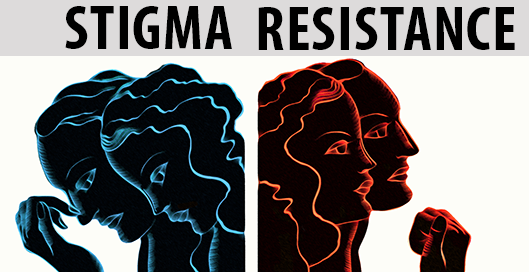A new study in press in the Journal of Schizophrenia Research finds that patients who actively resist the negative stigma associated with mental health diagnoses may have better outcomes. According to the researcher’s meta-analysis of previous studies, stigma resistance is related to reduced symptoms and improved functioning, self-efficacy, quality of life, recovery, and hope.
Public opinion studies reveal that negative attitudes about people who have been diagnosed with mental disorders are prevalent. Stigma is often defined by the degree to which individuals express a desire to avoid engaging with a person diagnosed with a disorder. Studies also reveal that self-stigma, when those diagnosed internalize negative attitudes about themselves, can have negative consequences for recovery, decreasing hope, quality of life, and increasing the severity of symptoms.
Theoretical work has proposed that stigma resistance, or actively challenging encounters with stigma and “rejecting a social identity that is tied to stigma,” may lead to greater empowerment and an increased sense of agency.

“Understanding the relationship between stigma resistance and outcomes across existing literature is important in order to further shed light on the process of stigma resistance, the link between stigma resistance and some of the negative outcomes that frequently accompany self-stigma, and how interventions might address stigma resistance,” the researchers, led by doctoral student Ruth Firmin from Indiana University – Purdue University, write.
To synthesize the existing literature on stigma-resistance, Firmin and her team conducted the first meta-analysis on this topic. After examining forty-eight studies on 8,187 individuals, they found that stigma resistance had a strong effect on overall outcomes, pointing to “stigma resistance potentially having a central role in recovery.”
“Stigma resistance was significantly related to each outcome domain in the hypothesized direction, with greater stigma resistance being related to greater overall outcomes, self-efficacy, quality of life, recovery, hope, insight and lower levels of symptoms and self-stigma,” the researchers write.
“Given the pervasive impacts of mental illness stigma, it seems important to note that stigma resistance was associated with improved outcomes for individuals across all diagnostic groups; thus, resisting stigma may be an important cross-diagnostic treatment target. Overall, stigma resistance demonstrated notable relationships with a variety of outcomes that are central to recovery and we suggest that further work on stigma resistance should guide intervention development in this important domain.”
*
Firmin, R.L., et al., Stigma resistance is positively associated with psychiatric and psychosocial outcomes: A metaanalysis, Schizophr. Res. (2016) (Abstract)















In other news, plants that receive more water grow taller, and people who hang out in the sun less get sunburned less often.
Report comment
Although, to be serious, an important issue with this article is whether the stigma resistance means:
1) Falsely believing that one has a brain disease while rejecting stigmatization of said illusory “Brain disease”
2) Rejecting the notion that hallucinations, delusions, and difficulty functioning represent a brain disease, and understanding one’s problems as understandable reactions to one’s life situation, thus rejecting the disease model.
Or some third combination.
I cannot get myself to go to some Schizophrenia Journal and read the article right now, just like I do not read Witchcraft Journal or Alchemy Journal.
Report comment
You’d still be irritated because it has a medical outlook far more comprehensive than the pseudo-medical concepts of orthodox psychiatry, but the Journal of Orthomolecular Medicine has the best remedy for stigma I’ve ever read- eliminating stigma by getting such a high degree of recovery in patients that they can easily pass for straight people. Since they don’t believe in treatments based only on drug therapy, the orthomolecular guys can regularly get high-functioning patients who don’t look or act strange, unless you think, as one of your bloggers did, that consuming large quantities of nutritional supplements is strange (it’s simply evidence you got chronic before you were properly treated).
Report comment
I have to agree, the term “stigma resistance” is an odd one. Perhaps it means those of us who didn’t believe we had a “lifelong, incurable, genetic mental illness,” because we had no familial history of such, and we knew we were fine before being drugged, but not fine after being drugged?
Or perhaps “stigma resistance” is similar to non-compliance due to disbelief in the psychiatrist’s stigmatization? I agree with old head, “being ‘diagnosed’ is inherently stigmatizing … Stop diagnosing and otherwise ‘othering’ people for being human and the whole ‘stigma’ issue will be moot.”
And telling people they have a “lifelong, incurable, genetic mental illness,” especially since decades of research has proven there is zero evidence any of the DSM disorders have any genetic basis, is a lie, intended to take away hope. And how is taking away hope beneficial to any patient?
Today’s psychiatric system is one gigantic gas lighting system, and gas lighting people is ‘mental abuse,’ not ‘mental health care.’
Report comment
Stigma is someone else’s problem not mine, unless they try to impose it on me at which point it’s time to go into defensive &/or confrontative mode. But being “diagnosed” is inherently stigmatizing anyway. Stop diagnosing and otherwise “othering” people for being human and the whole “stigma” issue will be moot.
Report comment
My thoughts exactly. Might as well say, “People who reject being labeled and ‘othered’ by the system and insist on their own solutions have better outcomes.” 80% of stigmatization is the result of the system itself stigmatizing its clients, or making it easy for others to do so.
— Steve
Report comment
Yes, and the very powerfully oppressive and damaging message behind this is “you have no power here.” The experience of socially imposed powerlessness is why people vacillate between rage and despondence, which wreaks havoc on the nervous system, among other things.
So I agree, the solution is to go elsewhere if one is in need of support, where one’s personal power is neither denied nor derailed by a stigmatizing system, but instead encouraged and strengthened, as the guide to healing, clarity, and making desired changes in one’s life.
Report comment
I managed to resist stigma by rejecting my label of “Mentally Ill.” I don’t think most psych specialists at the Mental Illness Factory would consider that a good thing. It cured me of the desire to kill myself though. 🙂
Report comment
You are a diseased leper aren’t you? No?
Aren’t all of your behaviours just positive and negative symptoms of mental illness? You can’t do anything right because you don’t make choices, you have an illness.
You reject you label of witchcraft? How dare you!
Report comment
If you come do my door to tell me that, you’d better bring the stormtroopers. They’ll be needed to keep you from being a martyr for Big Time Psychiatry.
Report comment
A strong sense of self renders stigma powerless. Still, an environment that is based inherently on stigma, such as the mental health system and its tangents, is toxic. Good self-care would mean to walk away from that and not look back, keep moving forward.
Report comment
Walking away is definitely the answer, but the entire mainstream medical community makes that very difficult. Meaning you sometimes need to not just walk away from the “mental health” system, but also the entire allopathic medical community for a while. The white coats do like to protect each other, when it comes to covering up any kind of iatrogenesis, including psychiatric.
Report comment
Yes, I agree Someone Else, I think that’s totally true. I had to walk in away in layers, so to speak. It was not a one shot walk-out-the-door deal. Took years, patience, and a lot of creative thinking to see new perspectives. That’s what opened each exit door for me, step by step. .
Walking away from psych drugs was one thing, then disengaging from ‘mental health’ practices altogether, then social services, then even professional advocacy–all of these seemed to be based on the same blueprint, to disempower, make dependent, and, indeed, psychologically and perhaps financially “enslave,” via all the programming which I believe plays on those stigmatizing beliefs. Makes a big mess for a person’s self-identity and really undercuts self-worth, etc., not to mention the ability to grow personally and professionally. It’s totally marginalizing if you don’t play the game.
I kept going back, if only to try to resolve things and also to help create sorely needed changes, but each time was the exact same story; I kept running into the same double-binding smoke and mirror type illusions, all that we talk about here. I could not believe how utterly stubborn and sticky this all was, as we’ve discovered, like tar.
I think at least making the intention to walk away and disentangle from all that is a step in the right direction. I find it literally crazy-making. There are better ways to find healing and avenues of support for personal growth, where we are NOT repeating trauma because it is not based on value judgments and social acceptance, but more so on individual process and personal evolution.
Report comment
Stigma is a form of abuse, it is social bullying. When bullies have no one to beat up on, they are left to either bully themselves, or get over it. That would be their choice.
Report comment
Slaves who resist slavery do better as ex-slaves than those who passively bow their heads and submit to slavery once slavery has been abolished.
What “stigma”? Nobody is literally branded anymore.
Oppressed people who resist oppression do better than oppressed people who passively submit. They eventually overcome their oppressors.
This “stigma” thing is about selling “treatment” to people over a lifetime. Notoriously psychiatry has been unable to restore people to their wits. 1 + 2 = 3. There’s no profit for a doctor with no patients. There is no “stigma” involved in not buying treatment, there is only a “stigma” associated with buying treatment (or, sure, having been treated). Complain about people in bondage to the mental patient role for a lifetime, and you are “stigmatizing” them. People are entitled to receive a check from the federal government for as long as they live after institutional disablement. Otherwise, we’d have to institutionally enable them, wouldn’t we?
Again, it’s not resistance to “stigma” as there is no “stigma”, not literally, it’s resistance to oppression. Oppression, wealth and power disparities, they are very real.
Report comment
You made the best response. “slaves who resist slavery”.
Report comment